-Ursula K. LeGuin
"Divine Justice demands that the rights of both sexes should be equally respected since neither is superior to the other in the eyes of Heaven. Dignity before God depends, not on sex, but on purity and luminosity of heart. Human virtues belong equally to all!"
-Abdu'l-Bahá, Paris Talks
“Come, tell me, hast thou not seen a play acted in which kings, emperors, pontiffs, knights, ladies, and divers other personages were introduced? One plays the villain, another the knave, this one the merchant, that the soldier, one the sharp-witted fool, another the foolish lover; and when the play is over, and they have put off the dresses they wore in it, all the actors become equal.""Yes, I have seen that," said Sancho."Well then," said Don Quixote, "the same thing happens in the comedy and life of this world, where some play emperors, others popes, and, in short, all the characters that can be brought into a play; but when it is over, that is to say when life ends, death strips them all of the garments that distinguish one from the other, and all are equal in the grave.""A fine comparison!" said Sancho; "though not so new but that I have heard it many and many a time, as well as that other one of the game of chess; how, so long as the game lasts, each piece has its own particular office, and when the game is finished they are all mixed, jumbled up and shaken together, and stowed away in the bag, which is much like ending life in the grave."
-Miguel de Cervantes, Don Quixote
"Doctors at a hospital in Qalat, capital of Zabul Province in southern Afghanistan, are treating a brutally tortured woman whose husband cut off both her ears and nose, broke her teeth and shaved her head only three months after their marriage. The victim, 16-year-old Nazia, is also suffering from psychiatric distress due to her experience, according to a doctor in Qalat hospital. From her bed in Qalat hospital Nazia told IRIN her story:
“My family wedded me to Mumtaz [a 40-year-old man] some three months ago, in Pakistan. Soon after our marriage we moved to his house in Qalat where his relatives told me he had another wife who had died a year ago. In Qalat my husband was jobless and was always complaining about economic problems. Two weeks after we moved to our new home he beat me for no obvious reason.
“One day I asked him to let me go to a party at my in-laws. He agreed and said I should return home in the afternoon. That day, although I came home early, I found him very angry. He beat me again, worse than the first time, and warned that he would kill me if I stepped outside the home again. He also told his brother and nephews not to come to our house in his absence.
“Day-after-day Mumtaz’s suspicion increased. He was thinking other men were visiting me while he was not at home. He did not listen to my pleas and was always saying that all women are bad and unfaithful to men. During this time he often beat me with a stick. “One night he hit me so much that I fainted. When I regained consciousness I found my head had been shaved. I cried so much, but he did not care. “One week later he knocked me down, bound my hands, and then broke my teeth with a stone. He also poured boiling water on my feet. After this I could not walk and was in a lot of pain, but he said I was only pretending. “No one was coming to our house so I could not tell anyone about my situation. I had nowhere else to go either. My family lives in Pakistan.
“One night I could not cook dinner for him because I could not stand on my feet. He got so upset when he found that there was nothing for him to eat. He started beating me. Again, he bound my hands with a piece of cloth. I felt a terrible pain in my left ear and then blood was flowing down my face. I thought that he wanted to kill me so I started screaming. Then I felt a similar pain in my right ear and more blood. “I tasted a mixture of blood and tears in my mouth while my voice was fading. I felt the worst pain in my life only a few seconds later when my husband used his knife to cut off my nose. I fainted.
“Now I do not know where my husband has gone.”
(Source: IRIN, Qalat, 26/12/07)
http://www.groundreport.com/article.php?articleID=2851482

Child brides
"He’s forty, she’s eleven. And they are a couple – the Afghan man Mohammed F.* and the child Ghulam H.*. “We needed the money”, Ghulam’s parents said. Faiz claims he is going to send her to school. But the women of Damarda village in Afghanistan’s Ghor province know better: “Our men don’t want educated women.” They predict that Ghulam will be married within a few weeks after her engagement in 2006, so as to bear children for Faiz.
During her stay in Afghanistan, it consistently struck American photographer Stephanie Sinclair how many young girls are married to much older men. She decided to raise awareness about this topic with her pictures. Particularly as the official minimum age for brides in Afghanistan is sixteen and it is therefore illegal to marry children.
Early marriages are not only a problem in Afghanistan: worldwide there are about 51 million girls aged between 15 and 19 years who are forced into marriage. The youngest brides live in the Indian state of Rajasthan, where 15% of all wives are not even 10 years old when they are married. Child marriages are a reaction to extreme poverty and mainly take place in Asian and African regions where poor families see their daughters as a burden and as second-class citizens. Already in their younger years, girls are given into the “care” of a husband, a tradition that often leads to exploitation. Many girls become victims of domestic violence. In an Egyptian survey, about one-third of the interviewed child brides stated that they were beaten by their husbands. The young brides are under pressure to prove their fertility as soon as possible. But the risk for girls between the ages of 10 and 14 not to survive pregnancy is five times higher than for adult women. Every year, about 150,000 pregnant teenagers die due to complications – in particular due to a lack of medical care, let alone sex education."
http://www.unicef.de/foto/2007/english/index.htm
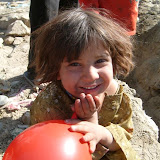
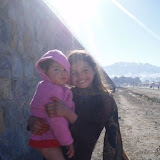

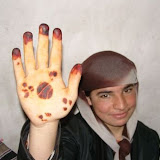

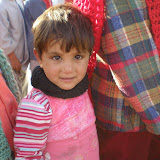

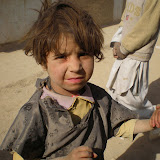

No comments:
Post a Comment